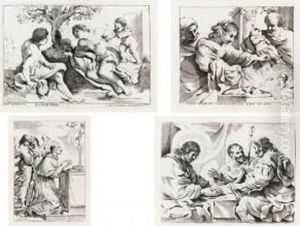Giovanbattista Pasqualini Paintings
Giovanbattista Pasqualini, born in 1618 and deceased in 1657, was an Italian singer and composer of the Baroque era, whose life and career, though not as widely recognized as some of his contemporaries, played a significant role in the musical landscape of 17th-century Italy. His contributions, primarily within the realm of vocal music, reflect the stylistic transitions and the rich cultural milieu of his time. Pasqualini's work is emblematic of the period's evolving musical tastes and the growing prominence of opera and secular music alongside traditional sacred compositions.
Pasqualini came from a musical background which greatly influenced his early development and future endeavors in the arts. He was known for his exceptional voice, a countertenor, which was highly prized in the Baroque period for both operatic and chamber music. His talents not only as a performer but also as a composer garnered the attention of influential patrons and musicians. Pasqualini's career was notably connected to the Barberini family, prominent patrons of the arts who played a pivotal role in the cultural scene of Rome during this era. His association with the Barberini family provided him with significant opportunities to perform in and compose music for a variety of settings, ranging from private chamber concerts to public operatic performances.
Throughout his career, Pasqualini composed a variety of works, including cantatas, arias, and other vocal pieces, which were characterized by their expressive melodies, intricate vocal lines, and the blending of textual and musical elements to convey emotional depth and narrative. His compositions reflect the broader trends of the Baroque era, including the emphasis on emotional expression, the exploration of dramatic themes, and the innovative use of musical forms to engage listeners.
Despite his contributions to the music of the 17th century, Giovanbattista Pasqualini's works have not survived in abundance, and his name is not as familiar in the annals of music history as some of his contemporaries. However, recent scholarship and interest in the Baroque period have led to a reevaluation of his role and the significance of his musical output. Today, Pasqualini is recognized for his artistry both as a composer and as a performer, and his work continues to be studied by scholars and performed by musicians interested in the repertoire of the Italian Baroque. His legacy, while perhaps not as widely celebrated, is a testament to the rich and diverse musical culture of his time.
